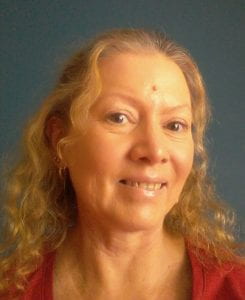Some may view mature-age study as a ‘return to education’, when in actual fact it is a progression. With every academic goal that is met, an individual continues to strive forward. A fantastic example of this is Nina Roberts, current Bachelor of Arts with Honours (History) student whose study is motivated by her inspiring drive and curiosity for her field of study.
Nina’s spark of inspiration and passion for history began long before her studies at UNE, much like her chosen field, to understand the context of this story one most start in the past.
“I have loved history and archaeology since I was a kid travelling around the Australian countryside during school holidays,” said Nina when recalling what drew her to her current studies. “After moving with my, at the time, very young two children, from NSW to Queensland in 1989 I was bitten by the family history bug.”

Nina Roberts, Bachelor of Arts with Honours (History) student
“It was after I’d had spent time in hospital in 1996 fighting a serious neurological disorder that paralyses the nervous system then a long time undergoing various physical therapies that I decided the best way to get the neurological pathways in my brain firing properly again was to have another go at academic study. I came across an ad for online courses at UNE and the rest, as they say, is history!”
After deciding that she wanted to concentrate on history, Nina began study with UNE through the Foundation Program as a way of bridging the gap between her previous and current study.
“I cannot rate that program more highly for teaching me the academic skills I needed. Encouraged to apply for admission into a BA degree I decided on a double major in Australian and International History which I later changed to Australian History and Archaeology.”
Since beginning her studies in 2014, Nina has completed her Bachelor of Arts and in 2020 began part-time study of Bachelor of Arts with Honours. As of September 2021 she is nearing the end of her Honours with only a few months of thesis writing to go. The decision to complete an Honours degree was motivated by Nina’s goal of progressing to a PhD.
Moreover, Nina already has her eyes set on what comes next in her study journey as she plans to focus her PhD studies on unexplored areas of convict labour at Port Arthur in the 1860s and 70s. Her research was supported by an Australian Research Council Discovery Project grant awarded to academics in UNE’s Department of Archaeology Classics and History in 2017.
Moving back to the recent past, when asked about her proudest achievement throughout her study journey Nina, a true scholar at heart, mentioned having her undergraduate research published in 2020:
“My research on ‘The lives and labour skills of Port Arthur convict woodworkers, 1866-1874’ was published in the special 2020 issue of the Journal of Australian Colonial History. It was an exciting but also nerve-wracking experience that taught me a lot about the process of peer review and publication. I was also privileged to have studied with or been taught by many of the other authors in that particular issue and therefore be part of such an awesome ‘team’ of researchers and writers.”
The research that Nina is currently focused on as the thesis portion of her Honours study expands her previously published work – her current study is: ‘Port Arthur’s labour gangs, 1860-1877: The aged and ailing dregs of the convict system?. The research is based on a series of workbooks or ledgers in which Port Arthur administrators recorded the labour undertaken by tradesmen and work gangs during the closing years of the penal station.
Honours research often means vastly different types of study depending on the choices and preferences of the student, for Nina her Honours research has involved gathering all the available conduct, labour, prison and medical records relevant to her specific research area and analysing the information. By collating this alongside other primary sources, Nina will in a few months have a completed thesis that thoroughly explores the nuances of the Port Arthur labour gangs from 1860 to 1877.
With the finish line of her Honours in sight Nina has found that there have been many insights throughout the research process. For example she has found that many of the stereotypical assumptions made about the capabilities of convict men during the tail end of the ‘convict era’ are not necessarily true.
“It amazes me how much industry was still going on at Port Arthur and the huge variety of things being made at every level of the production process. This was on top of an incredible amount of repair and maintenance work being carried out to keep the settlement (including outstations) functional. Supposedly these men were, for the most-part, the aged and ailing dregs of the convict system.”
“One of the other really interesting areas I’ve been looking into is convict health. Because of an amazing set of ledgers that were left behind from 1868-1877 we get to see into the world of 19th century medical treatment and realise how lucky we are regarding advancements in science and technology. Some of those old instruments…shudder…and the treatments using lead (including eyewash), mercury and arsenic mixed with copious amounts of opioids and other mind-altering substances are mind boggling to say the least!”
Truly outstanding research can rarely be achieved in a vacuum, as such most researchers find themselves hugely benefitting from support. For Nina this support came in the form of the UNE Convict Research Collective, which is an initiative by staff of Archaeology and History at UNE who specialise in promoting student research.
“It is a very supportive and encouraging group that share ideas, findings, and resources, something that is particularly important during a pandemic!”
“I seriously couldn’t have gotten to this point without the amazing support and encouragement of the professors in the Department of Archaeology, Classics and History and other students. It is so encouraging to see the number of new students also pursuing further study within the humanities. Through the Convict History Research Collective staff and students are exchanging ideas and helping each other develop our projects. What uncertain and scary times we live in, but on the other hand, how exciting to picture the important work all these academics and students will pursue and share.”
Naturally as a passionate student and true scholar Nina has some final words of advice for her fellow students who are looking to follow a similar path as she:
“In general, don’t be afraid to ask lots of questions (no question is stupid) or to ask for help if you need it (academic or otherwise) as UNE has some wonderful teachers and support programs. We are after all human, and sometimes feel out of our depth and a bit lost.”
“Follow your academic dreams and never stop researching, writing, and getting excited about finding new morsels of information that push you to keep expanding your knowledge. Find like-minded people that you can rave on about history with; those whose eyes won’t glaze over with boredom.”



I just wanted to say thank you for writing this, Nina. I have needed some inspiration lately, and your story resonates on so many levels. I have taken much longer, to do so much less, but I’m not ready to give up yet!
Your final paragraph here is printed and going up on my wall above my desk.
Thank you.
Margie
Thank you Margie, I really appreciate your feedback and applaud your determination to just keep pushing on. You in turn inspire me!
Despite Covid I have been very lucky to interact with some amazing Humanities students on campus (this year’s Honours students & some Ph.D. candidates) and online helping out in HINQ201. So many incredible personal stories and inspirational research ideas and projects. That sense of community is definitely what keeps me going when things get a bit blah!
Keep up the good work,
Cheers, Nina.